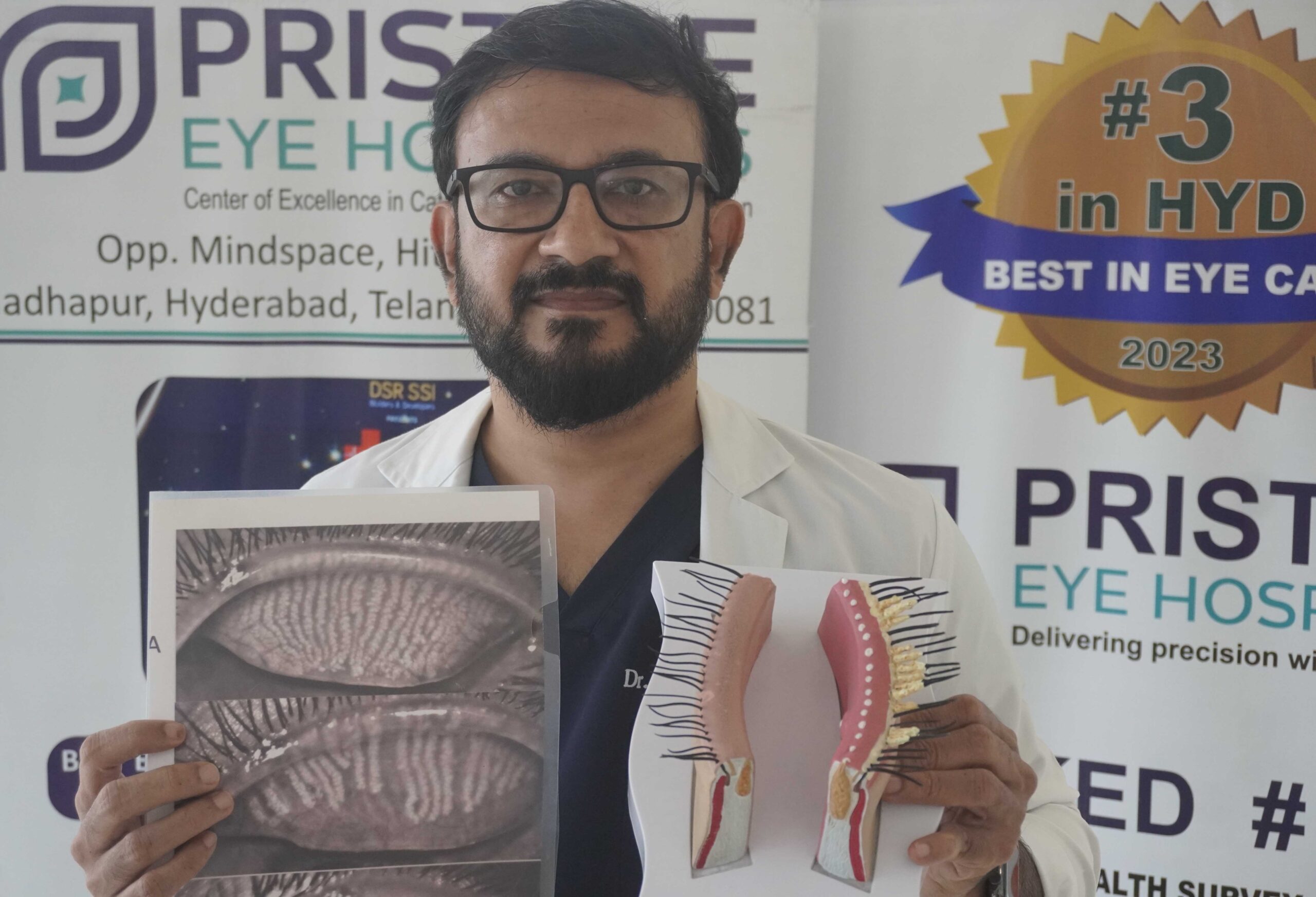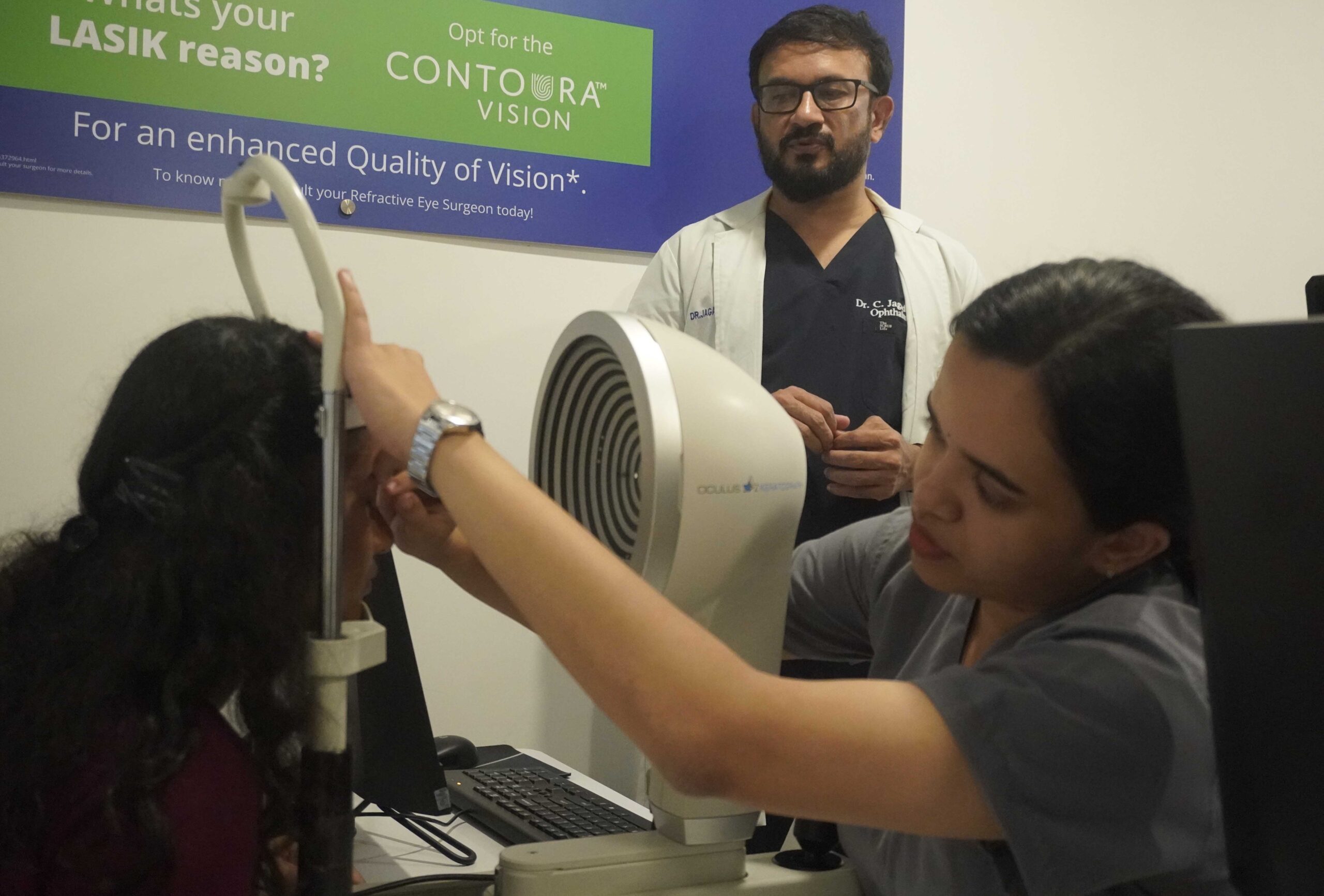Dr. Sriram; CMO and Consultant VitreoRetina, Sankara Eye Hospital, Hyderabad
Synopsis: During every pregnancy, bodily changes occur, and eye changes are no exception. If you currently suffer from an eye condition, you may question whether it will get worse while you’re pregnant. This blog will help you understand what happens to your eyes during pregnancy, why certain symptoms appear, and what precautions you should take to save your vision during these all-important nine months.
Pregnancy is all about transformations. Your body undergoes numerous adjustments to support the development of your baby. You may expect changes in your skin and weight, but almost all women are surprised to find changes in their vision as well.
Something like glaucoma, diabetic retinopathy, or dry eyes- if you have any dry eye conditions, it is normal to think about whether pregnancy will worsen the condition. Let’s walk you through what happens to your eyes during pregnancy and what you can do to take care of them.
How Pregnancy Affects Your Eyes ?
During pregnancy, your hormone levels fluctuate. These hormonal changes can influence different parts of your body, including your eyes. Some of the common eye-related symptoms during pregnancy include:
● Blurry vision
● Dryness or irritation in the eyes
● Sensitivity to light
● Temporary changes in prescription
Typically minor, these problems disappear after birth. However, if you already have an eye condition, the changes might feel more noticeable.
Common Eye Problems That Can Get Worse During Pregnancy
1. Diabetic Retinopathy
If you have diabetes, pregnancy may accelerate the progression of diabetic retinopathy, a condition affecting the small blood vessels in your retina. If left untreated, diabetic retinopathy can lead to loss of vision.
Pregnancy comes with unpredictable blood sugar levels. Uncontrolled blood sugar levels further strain the vessels that carry blood to your eyes. If you already have diabetic retinopathy, regular eye appointments during your pregnancy are very important.
What you can do: Make at least a single visit to the eye specialist every trimester. Also, work closely with your gynaecologist and a diabetes specialist to manage your blood sugar levels.
2. Glaucoma
When excessive pressure accumulates in the eye, it can damage the optic nerve, leading to glaucoma and vision problems. If you are currently being treated with glaucoma medications, you may need to switch medications or possibly stop the medications completely during pregnancy.
The baby may be impacted by certain glaucoma medications, particularly during the first trimester. However, there is some evidence to suggest that some women, while pregnant, may have lower pressures in their eyes, and this lower pressure could mean that during the pregnancy, they don’t need medication for glaucoma at all.
What you can do: Do not stop your medication on your own. Speak with your eye specialist and your obstetrician to work out the proper treatment plan that considers your health and the safety of the baby.
3. Graves’ Eye Disease (Thyroid Eye Disease)
Pregnancy might occasionally exacerbate symptoms if you have thyroid-related ocular conditions such as Graves’ disease. You can experience increased discomfort, redness, or eye bulging.
The immune system is impacted by hormonal changes during pregnancy, which may cause autoimmune diseases like Graves’ disease to flare up.
What you can do: Pay careful attention to the symptoms. Inform your physician of any bulging, pain, or changes in vision. After delivery, symptoms usually subside.
4. Retinal Issues
If you previously experienced retinal problems, retinal tear, detachment, or had prior surgery, pregnancy itself does not worsen the problem. However, stress from labour and pushing could potentially be a concern in rare instances.
Normal practice for doctors is to examine the integrity of your retina to determine if having a normal vaginal delivery is safe or if a C-section is more appropriate.
What you can do: Have an examination of your retina in the third trimester of pregnancy, and consult with your gynaecologist and eye doctor so they can guide you on the most appropriate, safest way to deliver your baby.
Eye Problems That Can Develop During Pregnancy
Even if you’ve never had an eye issue before, some problems may show up during pregnancy:
a. Preeclampsia-related vision changes: Blurred vision, light sensitivity, or seeing spots, can be signs of preeclampsia, a condition characterised by high blood pressure.
b. Temporary vision shifts: You may feel that your glasses are no longer working properly. This happens due to fluid retention in the cornea.
c. Dry eyes: Hormones can reduce tear production, leading to dry, itchy eyes.
These are usually temporary and go away after your baby is born. But if they’re bothering you, don’t ignore them, talk to your doctor.
Tips to Take Care of Your Eyes During Pregnancy
1. Keep sugar levels in control: If you have diabetes, regular monitoring and a healthy diet are key. It helps prevent complications like diabetic retinopathy.
2. Don’t skip eye check-ups: If you already have an eye condition, continue visiting your eye specialist regularly. Pregnancy is not the time to miss appointments.
3. Stay hydrated: Drinking plenty of water helps reduce dryness in the eyes.
4. Use safe eye drops: If your eyes feel dry or irritated, ask your doctor to recommend pregnancy-safe lubricating eye drops.
5. Adjust your screen time: Long hours spent on phones or laptops can further strain your eyes. Take breaks and blink often to avoid discomfort.
6. Wear sunglasses: Your eyes may become more sensitive to light during pregnancy. Sunglasses with UV protection can help reduce eye strain and protect your eyes from the sun’s harmful rays outdoors.
During pregnancy, one should care for their eyes at least as much as any other part of their body, especially if they have a pre-existing eye condition. Awareness, regular eye check-ups with a specialist, and managing any existing eye conditions will help maintain her eyesight throughout her pregnancy journey. After all, it’s not just about seeing the baby clearly when it appears. It’s about seeing everything in one’s life with great clarity and comfort.
FAQs on Can Pregnancy Worsen Pre-Existing Eye Conditions?
1. Can I wear contact lenses during pregnancy if I have dry eyes?
Contact lenses can be worn, but dry eyes may make them uncomfortable for many pregnant women. Subject to your doctor’s approval, consider switching to glasses during these months or using lubricating drops.
2. Will my eyeglass prescription change permanently after pregnancy?
The changes are usually temporary. After delivery, your vision should adjust to normal within a matter of weeks. It is preferable to wait a few months after delivery to get a new glasses prescription.





